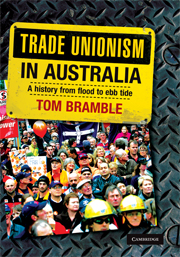2 - The union upsurge, 1968–74
Published online by Cambridge University Press: 05 May 2010
Summary
The breakthrough, 1968–69
By the end of 1967 the situation was ripe for a breakthrough. The employers were using the penal powers to prevent workers from striking to take advantage of the labour shortages and a booming economy. The ACTU had lobbied the Coalition Government for years to amend the penal powers in some way, but to no avail. The penal powers would have to be broken by a full-scale confrontation. The Transport Workers' Union had shown the way when in 1963 it had threatened a national strike by its 60 000 members, resulting in the removal of the bans clause from its award. The so-called ‘absorption decision’ of the Arbitration Commission started a series of events that were to culminate in such a confrontation on a national scale.
In December 1967, the Full Bench of the Arbitration Commission granted metal tradesmen a $7.40 wage increase following a ‘work value’ inquiry. However, it also advised employers that they were free to offset (‘absorb’) this increase against existing over-award payments that were almost exactly equivalent to the work value increase. Further, there was to be no increase for tradesmen's assistants. The work value case had resulted in precisely nothing for the workforce. The metal trades unions did not take this lying down. Strikes in the metal and engineering industry were already on the increase and in 1967 the sector accounted for more than one-third of all strike days.
- Type
- Chapter
- Information
- Trade Unionism in AustraliaA History from Flood to Ebb Tide, pp. 41 - 72Publisher: Cambridge University PressPrint publication year: 2008



